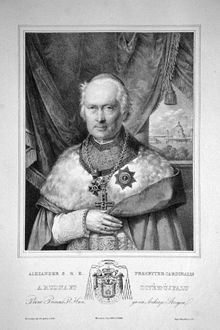Alexander Rudnay
|
His Eminence Alexander Rudnay |
|
|---|---|
| Cardinal Archbishop of Esztergom | |
 |
|
| Appointed | 28 July 1819 |
| Term ended | 13 September 1831 |
| Predecessor | Karl Ambrose Ferdinand von Habsburg |
| Successor | József Kopácsy |
| Orders | |
| Ordination | 12 October 1783 |
| Consecration | 21 April 1816 by Sigismund Anton von Hohenwart |
| Created Cardinal | 15 December 1828 |
| Rank | Cardinal |
| Personal details | |
| Born | 4 October 1760 Szentkereszt, Kingdom of Hungary (today Slovakia) |
| Died | 13 September 1831 Esztergom, Kingdom of Hungary |
| Buried | Esztergom Basilica |
| Nationality | Hungarian |
| Denomination | Roman Catholic |
| Parents | Andrej (András) Rudnay Anna Dőryová (Dőry) |
| Previous post | Bishop of Transilvania, Erdély, Siebenbürgen (1816-1819) |
| Signature | |
| Coat of arms |  |
Alexander Stefan Rudnay de Rudna et Divékujfalu (Hungarian: rudnai és divékujfalusi Rudnay Sándor István; 4 October 1760 – 13 September 1831) was a Hungarian Roman Catholic priest of Slovak ethnicity. He started as a parish priest, but later he became the Archbishop of Esztergom, the Prince Primate of the Kingdom of Hungary and a Cardinal.
Alexander Rudnay was born to a family of lower nobility, which originated from the ancient Hungarian gens (clan) Divék. The Rudnay family also preserved its coat of arms from the genus: a brown bear under an extensive foliage of tee with blue background. His parents were András (Andrej) Rudnay, a servants' judge (Hungarian: szolgabíró; Latin: iudex nobilium) and Anna Dőry (Dőryová). He studied in secondary school (gymnasium) in Nitra (Nyitra), later in Emerican in Pressburg, philosophy in Trnava (Nagyszombat), theology in Buda and, finally, in the general seminary in Pressburg.
He was ordained on October 12, 1783 in Trnava and, in April 1784, he received his doctor degree in theology. In January 1785 started his spiritual career, and he was sent as a chaplain to Častá (Cseszte). Afterwards, he served in Hronský Beňadik (Garamszentbenedek), Trnava and Krušovce (Nyitrakoros). In 1805 he became the canonical clergyman in Esztergom, 1806 rector of the priest seminary in Trnava and, a theology professor, 1808 a titular bishop, a general vicarius in Esztergom, and a viceroy's councilor. He was appointed as the bishop of Transylvania seated in Gyulafehérvár in 1816. In December 1819 Alexander Rudnay obtained the papal bull with his nomination to archbishop of Esztergom and primate of Hungary. Upon the emperor's personal request, he moved his seat 1820 from Trnava to Esztergom. He was further the member of the Table of the Lords, secretary of the royal chancellery, and of the Secret Council. He adhered to the imperial court in Vienna and supported the Slovak culture, especially he saw that Slovak parishes were assigned to Slovak priests. In 1828, pope Leo XII named him a Cardinal. It is from this period that his most famous statement comes: „Slavus sum, et si in catedra Petri forem, Slavus ero.“ (I am a Slav, and I shall remain one, even if I were to sit in the Chair of Saint Peter.)
...
Wikipedia
